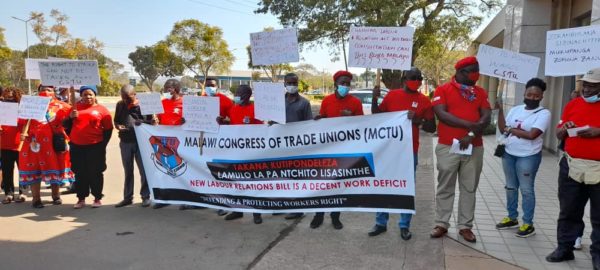By Charles Mkula

Malawi’s staggering economy could be brought further to its knees when the country’s Congress of Trade Unions proceed with plans to protest the passing of the Labour Relations (Amendment) Bill in Parliament. The Bill, which now awaits a presidential affirmation, seeks to restrain workers from using industrial action as a labour relations bargaining tool.
Reeling from the impact of Covid-19, the country is experiencing erratic growth, a reflection of various macroeconomic constraints such as high inflation rates which has increased the cost of doing business and low savings and investment ratio as a percentage of GDP.
All these, point to an ailing economy characterised by wide budget deficits and high government expenditure.
During the presentation of the 2021/2022 national budget last May, Finance minister, Felix Mlusu admitted that the budget had been formulated amidst some uncertainties due to the Covid-19 pandemic.
If the trade union/government stand-off is left unresolved by Thursday, the country should expect huge economic losses for both the public and private sectors as productivity would have come to a stand-still while workers are out on the streets.
Interestingly, the protests have been triggered immediately after government instituted strict Covid-19 preventative measures, which include not permitting gatherings of more than 100 people.
However, it is generally expected that Covid-19 restrictions must be balanced with protections enshrined in human rights charters.
Focusing on expectations of a rise in the number of Covid-19 cases because of human interactions at the protest marches could just as well be a distraction of the worker’s focus on their overall future welfare.
Denying workers their right to demand better working conditions for their own healthier lives as well as that of their families, is a much bigger health and social problem.
It is for this reason that the Malawi Congress of Trade Unions (MCTU), its 26 affiliates, the informal sector and other concerned stakeholders join in solidarity to protest against what they see as government overreach in its social restrictions against workers and their families. After all the ability to voice dissent is crucial for a functioning democracy.
Free Expression Institute National Coordinator, Peter Jegwa says protesting in the streets is one option for the workers to express their displeasure with government’s action. “They could also use other alternatives that will not put their health at risk,” he notes.

But MCTU General Secretary, Madaliso Njolomole says to be protected from the virus, protestors are advised to wear masks, carry hand sanitisers, observe social distancing and all other prescribed measures.
It would also be advisable to warn the police against the wanton use of teargas as this sends protestors to scramble for the safety of nearby enclosures, where chances of spreading the virus are higher than in the open air where they were demonstrating.
The government and other state authorities such as the police should, therefore, be advised not to use Covid-19 as a tool to exert excessive restrictions on free speech in the name of preventing the spread of virus.
Recently, the Human Rights Watch announced that it will hold to account those responsible for serious human rights violations and abuses
The United Nations Human Rights Council is also paying attention to how states are complying with their human rights obligations in responding to Covid-19, including the impact of restrictions on free speech and peaceful assembly.
The right to freedom of expression is very important if the right to freedom of assembly including to public protest is to be adequately enjoyed.
Workers should recognize that the country’s legislation still provides for the maintenance of the employment relationship during and after strike action as a normal legal consequence of recognition of the right to strike. Under the law, workers cannot be dismissed from work by the employer for participating in a lawful strike or protest.
Let Covid-19 crisis cement the belief that demanding, in practice and in law, a meaningful right to strike is a cornerstone for worker’s rights.
The right to stage industrial actions were introduced in Malawi in 1993, after the country attained multiparty democracy following the ouster of the one party dictatorship under the Malawi Congress Party (MCP).
*Charles Mkula is the General Secretary of the Journalists Union of Malawi (JUMA)

